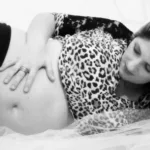
Being a mother is the dream of many women. The moment they know they are pregnant, a whole set of expectations begin to form about what their son or daughter will be like, already assuming the role of mother.
Unfortunately, sometimes nature can be very cruel and cause the pregnancy to be terminated, against the decision and will of the mother. Statistics confirm this: 1 in 3 pregnancies does not reach term.
Natural abortions, as common as they are, are mostly unwanted. The loss of a fetus is experienced like the death of a child, with an entire grieving process behind it. Psychotherapy after a miscarriage can help women who have suffered one overcome this tragic event.
Psychotherapy after a spontaneous abortion
Abortion can be one of the most traumatic events in a woman’s life. This event has real psychological consequences on the woman, especially in the case of spontaneous abortion, in which the pregnant woman had made some expectations of what her child was going to be like, what it was going to need and how her life was going to change. she. This type of abortion is very painful and the mother must be cared for so that her mental health does not worsen.. Unfortunately, many women are neglected by family members and acquaintances, perhaps due to the belief that losing an unborn child is less painful than a born one.
The woman experiences a whole series of emotions and feelings due to her loss: sadness, pain, anger, feeling of inadequacy, fear of never being a mother, fear of not being fertile, disagreements with her partner and family… Added to these emotions , are also the hormonal changes that have occurred in the woman’s body, which was preparing for the child that will no longer arrive.

Abortion: a vital crisis
Every abortion represents a before and after in a woman’s life, regardless of whether it has been provoked or has occurred spontaneously. However, spontaneous or natural abortion is especially critical, since the woman, who had formed expectations about her future child, suddenly discovers that she is no longer going to give birth to a child. Although the little one has not been born, It is experienced as a full-blown loss and begins a grieving process. to try to manage it.
Spontaneous abortion is a very difficult situation for those who suffer it. The pain caused by these events has no expiration date, time does not always heal wounds. This is why psychotherapy after an abortion of this type is so important, even more so if the tragic event occurs at a very advanced stage of pregnancy and all kinds of expectations had been created about what the baby was going to be like.
But We should not think that if the abortion has occurred during the first months of pregnancy, we will not suffer.. For a very short time that she had known it, the woman had already come to terms with the idea of being a mother and, suddenly, she has to come to terms with the idea that she is no longer going to be one. All the illusions that she had formed suddenly fall like a house of cards, and this hurts, a lot.
One third of pregnancies do not reach term. Spontaneous abortion is natural, common, and is part of the vital reproductive process. Just as not all seeds germinate, not all pregnancies reach the end. This may help those who have suffered a miscarriage that was not their fault, which happens. However, and although it is a fact that many women have spontaneous abortions throughout their lives, this fact does not prevent many from experiencing it with great pain. That’s why, No matter how common it is, their suffering should not be underestimated..
Psychological help to overcome an abortion
A woman who has suffered a miscarriage is a mother. We should not think that, when abortion occurs in the first weeks of gestation, since it is an early loss, we should deny it and continue with life as if absolutely nothing had happened. Of course something has happened, the mother has just lost a child that, although very little time had passed since she knew she was pregnant, she got the idea that she was going to give birth. But now You have to get used to the idea that in the end it’s not going to be like that..
If postpartum depression is rarely recognized both by the social environment and by the mothers themselves, that which arises due to having lost an unborn child is even less so. The belief is that since there has been no baby, there is no death to overcome. Many people, even people who are dedicated to obstetrics, come to deny the need to overcome miscarriage as the tragedy that it is.
Women who have experienced a miscarriage require psychotherapy to overcome it. What these mothers need are empathetic professionals who do not judge them, infantilize them or blame them.. Professionals who understand that they are not dealing with a woman who has simply stopped being pregnant, but rather a mother who has lost her child and with it all the illusions she had about what the baby was going to be like.
Psychotherapy after a spontaneous abortion uses various techniques and currents of clinical psychology to help women who have had to go through this difficult setback in their lives. Among the main techniques to overcome your grief we have:
1. EMDR
EMDR (Eye Movement Desensitization and Reprocessing) It is one of the most used techniques for trauma and grief, which is why it is so useful in the psychological treatment of spontaneous abortions because these are extremely traumatic experiences. Through EMDR, the healing and self-improvement mechanisms available to the patient are stimulated. The idea is to get them to overcome the situation both cognitively, emotionally and physically.
2. Cognitive-Behavioral Therapy
Cognitive-Behavioral Therapy cannot be missing when addressing any psychological problem, especially because it has the most empirical evidence to support its use and benefits. With her the woman can be helped to overcome the trauma by seeing a new vision of the miscarriage she has suffered.
3. Internal family systems model
In the internal family systems model, we work with the different parts of the patient’s mind, especially those that are related to the trauma of having experienced a miscarriage.
4. Sensorimotor Therapy
Sensorimotor therapy, along with EMDR, is considered to be one of the most suitable techniques to overcome the trauma associated with a spontaneous abortion. With her The patient is helped to overcome body memories and what she has not been able to express because she seems too disturbed or because she cannot consciously access it.. Sensorimotor therapy works with the body to free it from the burdens of a terminated pregnancy.
What to do if I have suffered an abortion?
Apart from going to psychotherapy, there are several recommendations for all women who have suffered an abortion, advice that can also be used for their family environment and partner to prevent the situation from worsening.
1. Support and understand
All women who have suffered a miscarriage need support and understanding. The worst thing your partner can do when this tragic event has occurred is to engage in blame games or treat the problem as something not so serious..
Each person grieves in a unique way. No one expects that their child will not be born, an event for which one is never sufficiently prepared. The illusions of having a baby overcome the rational thought that she might not be born and, sadly, when this happens there is a lot of suffering.
Both the woman who is no longer pregnant and the father require support, empathy, understanding, trust and closeness.
2. Let time pass
As we said before, time does not always heal wounds. Nevertheless, Grief requires time, going through some phases and not getting ahead of any of them.. It is the best way to ensure that the pain weakens, that the tragic event is managed in the best way one can, although for this it is advisable to go to psychotherapy to ensure that it is not a pathological grief.
3. Don’t be careless
The pain felt by the spontaneous abortion can cause the mother to abandon herself: she stops eating, socializing, does not sleep well, does not shower… Sadness and depressive symptoms make you neglect yourself, and it is the worst thing you can do. Both she herself and her partner must make an effort to avoid falling into this dangerous spiral of neglect from which it is very difficult to get out. You have to take care of yourself to have good physical and mental health.
4. Work on guilt
In addition to sadness and frustration, guilt and shame are two emotions that often arise after having suffered a miscarriage. It is very common for women who go through this event to have ideas like “I didn’t take care of myself enough.”“I will never be a mother”, “I am not a real woman because I cannot have children”… These thoughts should be worked on in therapy, both individually and with the couple.
5. Do not minimize the situation
Especially for the environment surrounding the woman, it is important not to minimize the situation. It is common that when you suffer a spontaneous abortion there is someone in the woman’s social environment who says phrases like “you should get over it now”, “focus on a new child”, “he was never alive, don’t worry” and others. that, although they are said to try to help women, they plunge her into misery. They are expressions that invalidate her feelings and what her own body, still that of a pregnant woman, transmits to her..
You shouldn’t stay stuck in grief, but it doesn’t benefit you to try to act as if nothing had happened. Yes, she has happened: she has lost her son. As we have said, a woman who has suffered an abortion is a mother who has lost her baby, and she will experience it as the death of a family member or friend. Her pain and feelings should not be minimized or invalidated.








